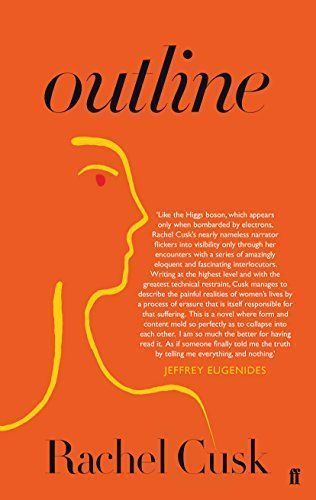
Outline
A woman writer goes to Athens in the height of summer to teach a writing course. Though her own circumstances remain indistinct, she becomes the audience to a chain of narratives, as the people she meets tell her one after another the stories of their lives. Beginning with the neighbouring passenger on the flight out and his tales of fast boats and failed marriages, the storytellers talk of their loves and ambitions and pains, their anxieties, their perceptions and daily lives. In the stifling heat and noise of the city the sequence of voice begins to weave a complex human tapestry. The more they talk the more elliptical their listener becomes, as she shapes and directs their accounts until certain themes begin to emerge: the experience of loss, the nature of family life, the difficulty of intimacy and the mystery of creativity itself. Outline is a novel about writing and talking, about self-effacement and self-expression, about the desire to create and the human art of self-portraiture in which that desire finds its universal form.
Reviews
mo@mofinegan
hessensitive@hessensitive
el.@mashamellow
Mitch@mitch
shain@shain
Andrew@shudder
Zainab @znybaa1
Chris Dailey@cris_dali
Clay Carey@clayclay
sani@luvterature
Orla Kilroy@orlajane
azliana aziz@heartinidleness
erika s@arikeee
jess@visceralreverie
karol tang@karolrtang
Jason Marder@jason_marder
taylor miles hopkins@bibette
Sarah Christine Gill@Gilly
Sage@tigerbalmreads
Amy Thibodeau@amythibodeau
Tess McMahon@tessmcmahon
Katie Chua@kchua
Charlotte J. Ruth@charlottejruth
Jenna@jenna
Highlights
mo@mofinegan
Page 199
mo@mofinegan
Page 197
mo@mofinegan
Page 160
mo@mofinegan
Page 105
mo@mofinegan
Page 94
mo@mofinegan
Page 65
mo@mofinegan
Page 59
hessensitive@hessensitive
hessensitive@hessensitive
hessensitive@hessensitive
hessensitive@hessensitive
hessensitive@hessensitive
hessensitive@hessensitive
hessensitive@hessensitive
hessensitive@hessensitive
hessensitive@hessensitive
Mariella@mariellah
Page 18
Shelby Doherty@dohertys17
Shelby Doherty@dohertys17
Shelby Doherty@dohertys17
Shelby Doherty@dohertys17
Shelby Doherty@dohertys17
Shelby Doherty@dohertys17
Shelby Doherty@dohertys17